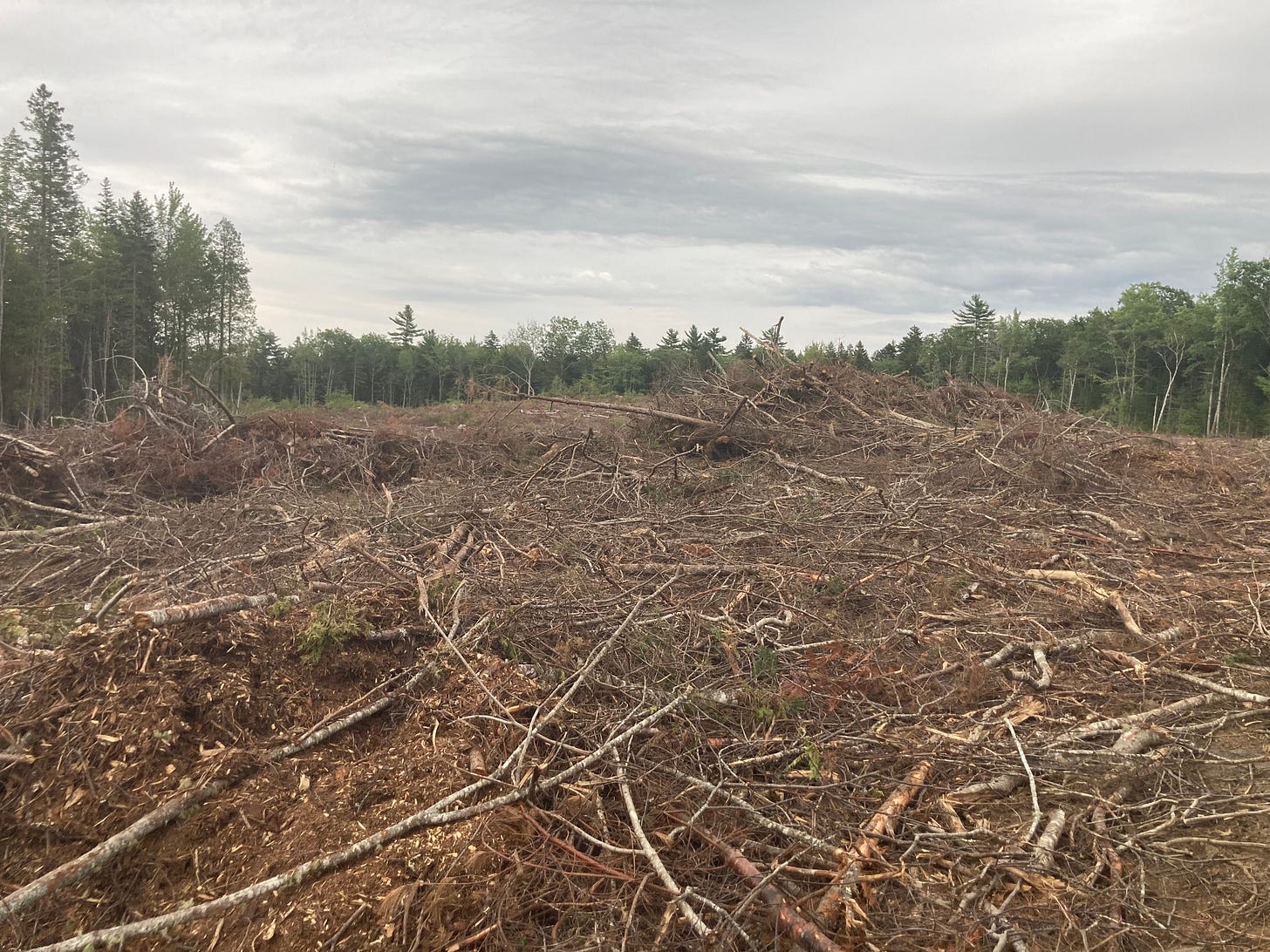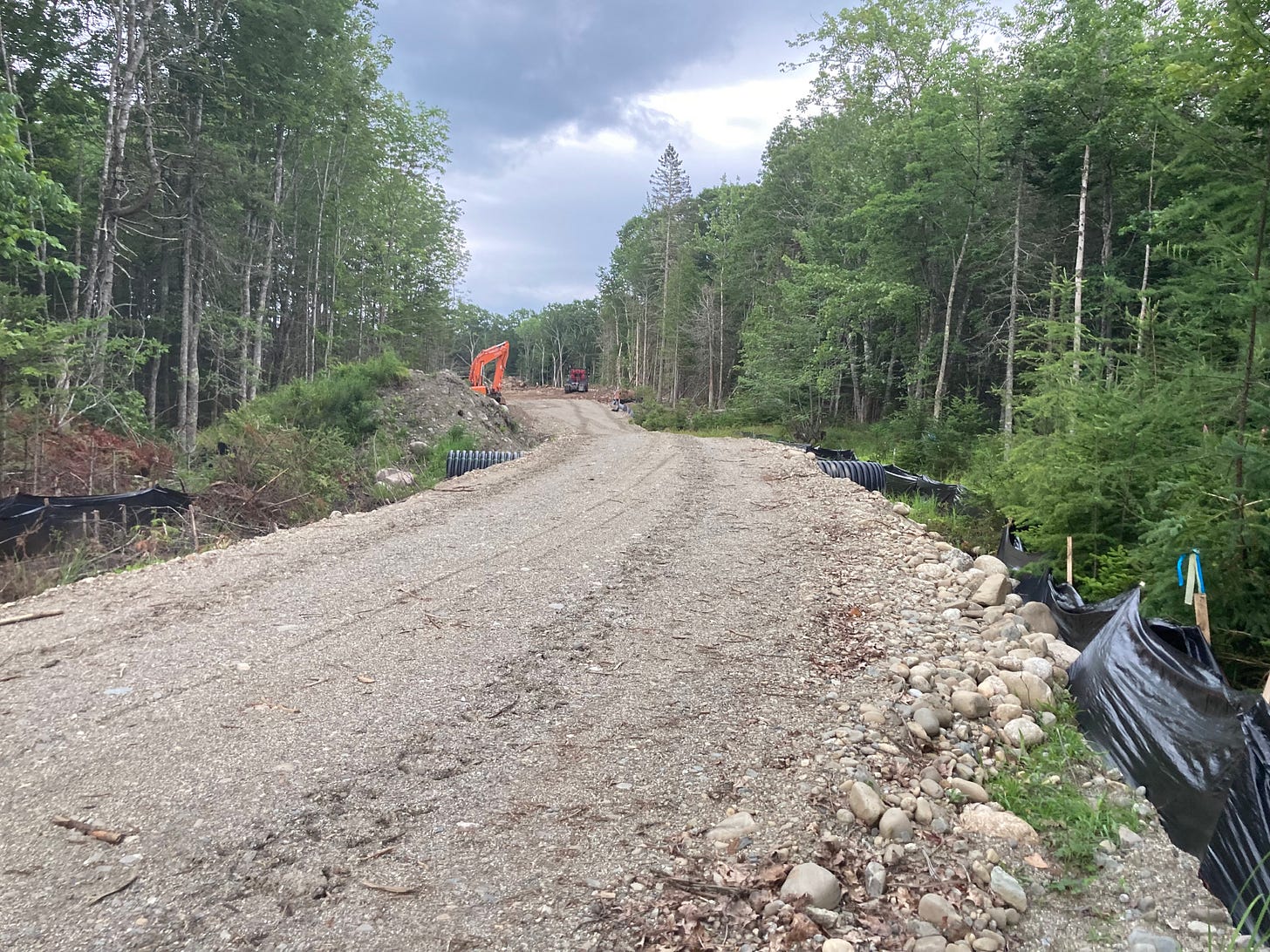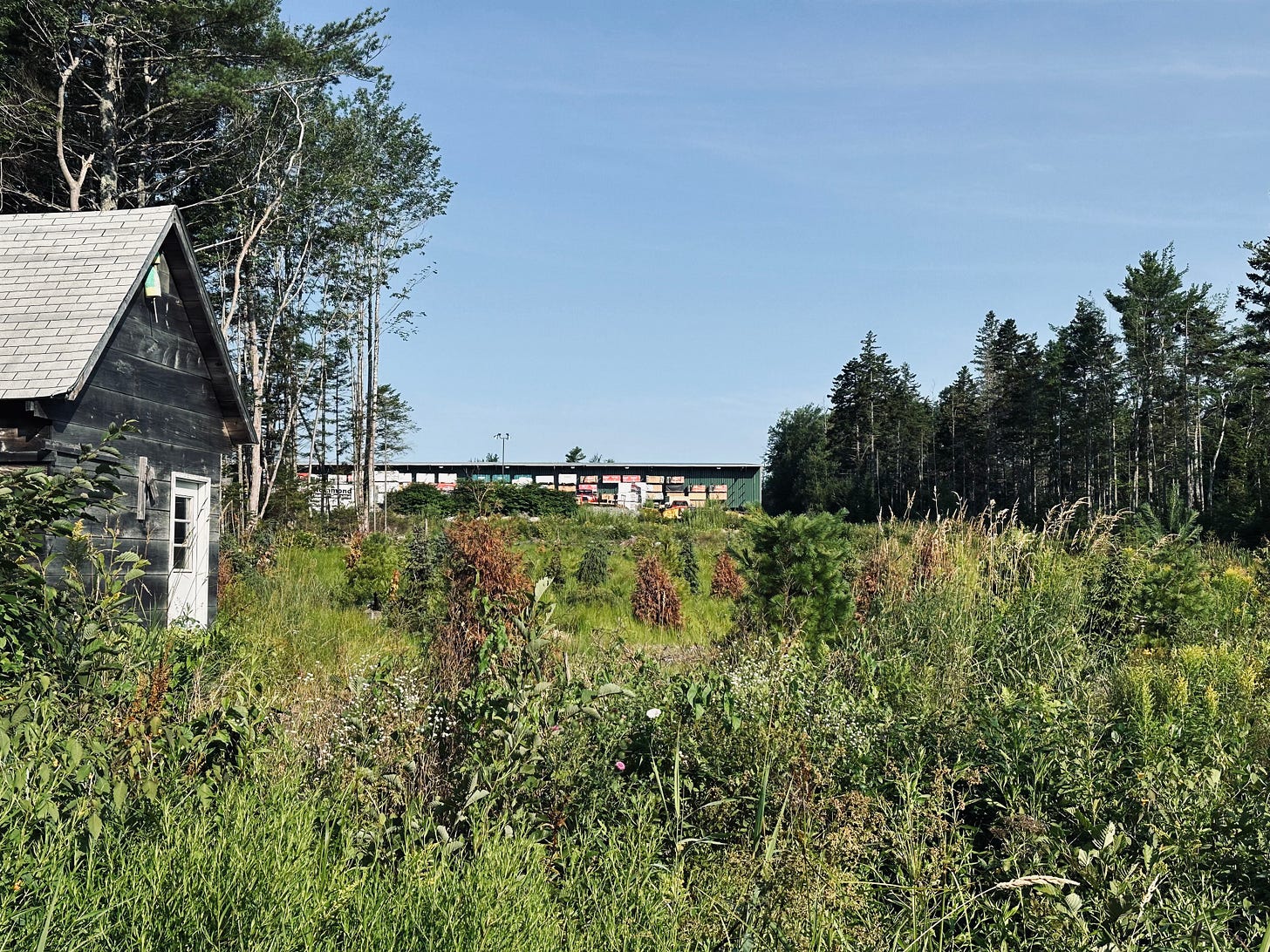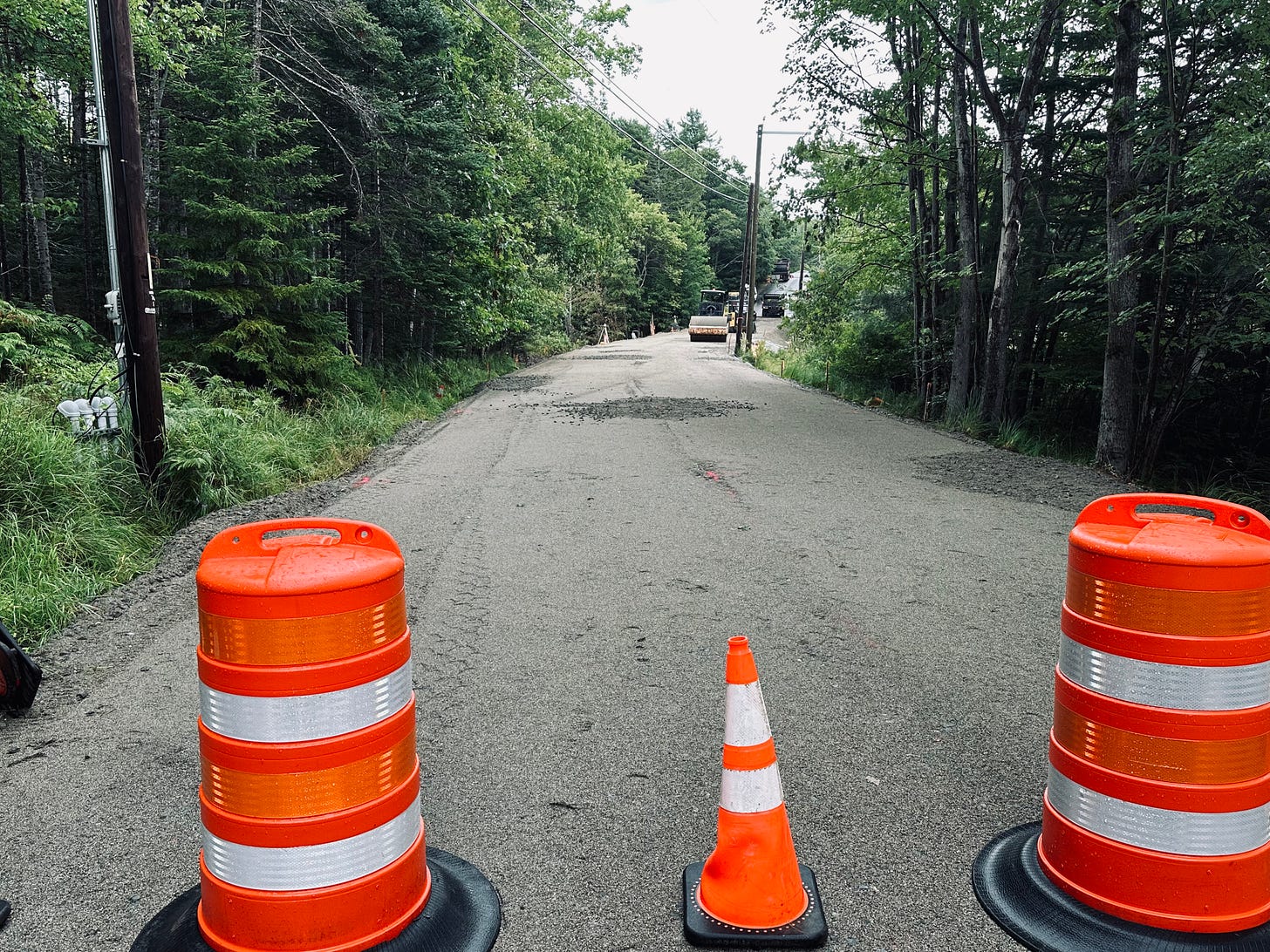Second clear cutting of forest in Town Hill leaves neighbors, officials perplexed, angry
Other news: As traffic gets worse, Is housing crisis the culprit? SWH wants clarity on hazardous waste plan for transfer station; what is the reach of the APPLL lawsuit?
BAR HARBOR, Aug. 5, 2023 - Neighbors, town officials and naturalists could only watch helplessly from afar as 10.5 acres of forest were clear cut on Town Hill recently by a commercial solar farm which they say offers negligible benefit to the town.
An observant resident took the photos and video below and sent them to the QSJ.
In less than a year and a half, almost 20 acres of forest have been clear cut in the Town Hill area, including the illegal removal of trees by Hammond Lumber in March 2022 which was reported by the QSJ. Hammond was given a notice of violation because part of the area included wetlands in the town’s shoreline zone. Hammond was ordered to replant some vegetation and trees.

“It’s a nightmare,” said Town Hill resident Michael Good of the latest clear cutting off Knox Road. “It's the largest clear cut that we've had out here in I don't know how long, decades anyway, more than decades.
“It would have been better to build homes in my mind. It would have been less destructive.”
Good, who runs a nature tour business, said there were at least 130 species of birds in that forest.
Migratory amphibians, deer, raccoons and other animals have also been displaced and are migrating to new habitats, he said.
Unlike the Hammond case, the town was an unwitting enabler of the Knox Road clear cutting. Voters in November 2021 approved an amendment to the land use ordinance allowing for “stand-alone” solar arrays and not just ones attached to existing structures.
That gave Midcoast Solar of New Harbor, Maine, an immediate opening to assess the quality of the electric grid in Bar Harbor which ultimately led the company to acquire a 53-acre parcel on Knox Road near a Versant Power substation.
By the time it filed an application for a permit in March 2022, the town was a sitting duck. The Planning Board felt it had no choice but to approve the solar farm after the original array was cut back from 14.5 acres to 10.5.
Town Council vice chair Gary Friedmann, a former board member of A Climate to Thrive stated in an email, “Neither ACTT nor I endorse subscription-based solar.”
“We believe that locally owned models such as co-op solar offer superior benefits to Maine ratepayers. We also prefer projects such as the Long Pond CSF and Tremont CSF which are built on brownfields (former landfills) and offer opportunities for local ownership.”
Luckily, Friedmann stated, Bar Harbor has a limited supply of such land near substations to enable other solar farms which require the taking of virgin land.
Midcoast had built a smaller solar farm in Bristol, Maine, and offered discount subscriptions to Bristol resident. No such discounts have been offered in Bar Harbor.
The application originally was opposed by Code Enforcement Officer Angela Chamberlain and Fire Chief Matt Bartlett, both of whom own abutting properties. Chamberlain told the Planning Board the town badly needs year-round housing and not commercial solar farms which gobble up land and sell electricity mostly to non residents.
One New England state, Massachusetts, discourages forest clear-cutting for solar after the state’s Audubon Society's reported in 2020 that roughly 6,000 acres of forest and farmland were converted to ground-based solar between 2012 and 2017 – one-quarter of all development in that state.
The state's Solar Massachusetts Renewable Target program adopted a policy that increases financial incentives for rooftop, parking lot and brownfield site projects, and reduces incentives for projects on undeveloped land.
"The idea that cutting down trees to put up solar panels is a net positive is just ridiculous," said Jane Winn, the executive director of the Berkshire Environmental Action Team. "Once every rooftop and parking lot is covered with solar, then we could see considering where else we might want to put [panels]."
In the town of Sandwich, a clear-cut of nearly 11 acres out of an 18-acre wooded parcel brought this reaction from The Cape Cod Climate Change Collaborative:
“When sited in undeveloped areas, commercial-scale ground-based solar arrays threaten the amount of forest cover on Cape Cod. The Climate Collaborative recommends prioritizing siting of such solar arrays, siting on brown fields, old industrial sites, depleted gravel pits and paved parking lots, and avoid undeveloped sites, such as forests or open fields.
“It is also important to understand that in selecting a forested site for solar, the carbon-reduction benefits of the solar array are significantly diminished with the loss of the carbon sequestration value of the cleared forest.”
MDI towns have successfully installed solar panels atop the high school and multiple municipal buildings. Tremont and Southwest Harbor received wide acclaim for their community solar farms as Friedmann stated.
But Bar Harbor is having a more difficult time with its effort to build a farm on the old Higgins Pit, a dumping area off Rt. 3 for waste and sludge from construction and hasn’t been used much since the town acquired it in 1972.
It is being tripped up by the same issue which plagued many other infrastructure projects on the island - easements - which slowed the Main Street project in Northeast Harbor and the Main Street sidewalk project in Southwest Harbor.
Town officials are meeting with nearby residents next week to discuss new rights of way needed to access the solar arrays at Higgins Pit and are waiting to hear from Versant about costs and plans to connect to its grid.
Town Manager Sarah Gilbert said the town has budgeted about $500,000 for equipment and labor to connect to the Versant grid but the price tag could be higher.
Meanwhile, the restoration project at Hammond Lumber is in danger of not meeting its goals, as almost 20 percent of the replanted trees have died.
Kevin Allcroft of Forestree Concepts, a vendor to the engineering firm hired to remedy the illegal taking of trees, stated in an email to CEO Chamberlain that the surviving number of trees still meet the goal of the restoration plan.
Barely.
“Of the 138 taller trees planted in the seven blocks close to Gilbert Farm Road, I found 25 that were completely dead, or more than 50 percent dead or leaning more than 45 degrees.
“Those 25 trees represent 18.1 percent of the total. The reforestation plan requires that at the end of five years we have 80 percent survival. Currently, they are still above the required 80 percent survival.
“In the next couple of weeks, I will be meeting with Hammond Lumber and Haley Ward (engineers) to review options to maintain at least 80 percent survival through five years along with the removal of the building.”
But that’s only the .75 acres of the shoreland zone over which the town has jurisdiction. The swath of forest eliminated by Midcoast Solar and Hammond will not be replenished until the solar farm is decommissioned in 25 to 30 years or until Hammond Lumber ceases to operate at that location.
The QSJ intends to monitor that.
Wish me a long life.
Is traffic pattern on MDI an indicator of a larger problem?
TOWN HILL - Wednesday at 4:30 p.m., the queue of northbound vehicles leaving the Quietside backed all the way to the Town Hill market.
The 2.3 miles to the head of the island took 25 minutes.
Even the most jaded locals are declaring this the worst summer traffic ever.
It is, simply, a stark rendering of the housing crisis as fewer workers are able to live here.
“It gets worse every year,” said one business woman on Rt. 102. She pointed to the release of employees from the island’s large employers - Jackson Labs, Hinckley Yachts - around the same time each afternoon.
So let’s call this the MDI Affordable Housing Traffic Index, using Town Hill as the current marker. Where will it be in one year, two years, five years?
Speaking of an index, which area town has the highest percentage of subsidized year-round housing for working families?
The answer: Cranberry isles, with 10 such homes on Great Cranberry Island and Islesford. My Friend Dick Bloom in the Islander wrote about two new modular homes being added this summer.
According to the 2020 census, the islands have a year-round population of 160.
The 10 homes were the work of the Cranberry Isles Realty Trust, formed in 1996 when the number of unbridged islands in Maine with a year-round population had fallen from 300 a century ago to just 15.
By comparison The Island Housing Trust, which was founded in 1989 and serves all four MDI towns, has acquired or built 45 units to serve a population of 10,000 year-round residents.
Bar Harbor is the only municipality on MDI with a detailed strategy to attack the housing crisis.
Mount Desert tweaked its zoning ordinance to allow for more density in the village of Northeast Harbor and will face a big test Wednesday night when an application for six housing units come up for consideration before the Planning Board.
Otherwise, Mount Desert, Southwest Harbor and Tremont have nothing in the works. Tremont is considering registration of short-term vacation rentals proposed by a consultant whose work was rejected by the Mount Desert select board and who has publicly declared a conflict because he operates a rental in Tremont.
The consultant said he first wants to collect data. All he has to do is park his car every afternoon at 4:30 at the head of Southwest Harbor and count the vehicle streaming out of town.
Planning board says conversion of vacation rentals to hotel does not require its approval
BAR HARBOR - If every existing vacation rental unit in downtown were to change to a hotel, how much revenue would the town lose?
That was not considered by the Planning Board Wednesday night when it voted 4-1 to approve a request by former planning chair Tom St. Germain for his client, Destination LLC, to forego a public hearing on its request to convert four vacation rental units to a hotel or motel.
St. Germain apparently is now a “rotating door” operative selling his knowledge of the land use ordinance as a consultant to commercial real estate owners.
The board only considered traffic implications and the ability for the owners to rent units by the night instead of multiple nights as required by the town’s vacation rental ordinance. The owners said the operating changes would be minimal.
New member Cosmo Nims said the increased frequency would likely increase traffic. He was the only vote against having the application be a staff decision, as opposed a board decision.
The board did not discuss the loss of registration fees paid by vacation rentals to the town.
SWH wants say on hazardous waste disposal as renewal of transfer station pact come into focus
SOUTHWEST HARBOR - What exactly is household hazardous waste?
I’m not sure but an awful lot of people line up once a year at the parking lot of the high school to dump them into vessels which are then carefully handled and disposed of by vendors hired to perform such a service.
Now the federal government has written a $350,000 check to towns on the Quietside to build a receptacle at the Long Pond transfer station here so residents may dispose of such waste more frequently.
All of which has representatives of the town of Southwest Harbor saying, “whoa, not so fast … we may not want folks from everywhere coming into our town with their hazardous waste.”
That was a key impetus for SWH to rejoin Acadia Disposal District, a collaboration of the towns of Mount Desert, Trenton, Tremont, Cranberry Isles and Frenchboro. SWH wanted a seat at the table after ADD (an unfortunate shorthand) first conceived of the idea of a more regular household hazardous waste disposal regimen.
SWH has the distinction (or misfortune) of being the site for the regional transfer station operated by EMR Inc., owned and operated by Lee Worcester, the largest landowner in town. It is one of only three such transfer stations in Maine owned and operated by a private company.
Select member Jim Vallette was recently named SWH’s representative on the ADD board. Vallette is a materials research consultant who claimed that the handling of household waste in repositories as suggested by ADD has had many failures.
(Examples and data to fortify that claim would be of great import.)
Meanwhile, here is the definition of household hazardous waste by the Maine DEP:
“TVs, computer monitors and other electronic devices, waste oil or gasoline, antifreeze, pool chemicals, fluorescent lights, thermometers and thermostats, batteries, old paint, and pesticides.”
ADD’s mission is to devise a collaborative way to dispose our waste. It does not concern itself with waste reduction.
The inherent contradiction is obvious: Disposing waste is one practice which has winner and losers. Reducing waste is a wholly different practice with winners and losers as well.
ADD and Bar Harbor are betting that the new owners of the MRC plant in Hamden will be the solution for virtually all its waste disposal needs. The Municipal Resource Committee of 115 towns is in celebration mode as the plant has begun reactivation which will take up to two years to reach full capacity.
The only other option besides landfill is the incinerator in Orrington which is in foreclosure and is scheduled for a public auction Aug. 9.
A lot is riding on the promise that the MRC plant will perform up to expectations. It will have been five years since it was closed in 2020.
Meanwhile, Worcester’s five-year contract with the town is up for renewal in 2024, and a band of folks have formed the Solid Waste Reduction Task Force, with the blessing of the select board, to question everything from his rates to how the trash is handled.
At a recent meeting, Vallette suggested the town investigate services which would pick up recycled materials such as cardboard and pay the town instead of the town paying a service to haul the materials at an exorbitant cost to an unknown destination.
The QSJ attempted to find such a service but to no avail. Vallette referenced the recycling center in Unity as the source of his information, but Unity is a member of the Maine Resource Recovery Association whose director told me he knows of no such service.
Instead Victor Horton, MRRA executive director, said the towns should reactivate their sorting systems which they abandoned years ago.
Ellsworth and Unity get the best price for their recycled materials because they employ balers to sort and package recycled materials, he said. Most of the trash on MDI are in a single stream or “zero sort.”
Even in the current depressed market, there is a premium to be had for higher quality recycled materials, Horton said.
“Ellsworth has a baler which keeps materials separate. We pay them money based on whatever the mills are paying. Some of the could go to Alabama, some go to Pennsylvania or Canada, all over the place.
“But they're giving us sorted grade - pretty, pretty clean material. Same for Unity.” Even though recycling may not be profitable, “you’re losing less than if you had it mixed all together,” Horton said.
APPLL lawsuit win would impact entire region, legal observers say
BAR HARBOR - If this town loses the APPLL lawsuit, are other towns prepared for the fallout?
Virtually every coastal town in Maine, Massachusetts, New Hampshire and Rhode Island will fall under the ruling by District 1 judge Lance Walker, say legal minds familiar with the case where local businesses are claiming an ordinance capping cruise ship visitation infringes on interstate commerce.
Are Northeast Harbor, Southwest Harbor, Tremont and waterfront towns up and down the coast prepared for the consequences of a federal decision?
What’s to prevent a cruise ship with 1,000 passengers to anchor just off Sutton Island and ferry passengers to multiple points of destinations, Southwest Harbor, Northeast Harbor, Great Cranberry, Islesford and Bass Harbor? Buses may trek them to Acadia National Park with little time difference from Bar Harbor, except that Bass Harbor Head Lighthouse, Ship Harbor, Wonderland and Seawall would have new appeal.
Are the towns in the Quietside ready for this possible eventuality - tsunami?
One island lawyer suggested other towns consider joining an appeal if one is pursued by lead citizen petitioner Charles Sidman, who was granted intervenor status by Walker.
The towns of Mount Desert, Tremont and Southwest Harbor have adopted much stricter bans or moratoriums against cruise ship visits than Bar Harbor.
MOUNT DESERT - Beech Hill Cross Road is scheduled to open Monday after rain on Friday delayed the paving. The undersized and aging culverts which caused a low-lying section to flood frequently were successfully replaced
Questions may be directed to Public Works Director, Brian Henkel, at 276-5743 or director@mtdesert.org







Re: Town Hill clear-cutting. It seems that Mt Desert Island will soon live up to it's name- "desert".
Take a look at a Google satellite map of your own neighborhood to see how much land has been cleared of trees and groundcover by your neighbors and by the businesses in your neighborhood.
The mosses and grasses that absorb water, returning it to the ground, will soon be gone and in the future we all will be drinking bottled water, because our wells will be dry. Take a wider look at the downeast coast and you will see that almost any accessible place with "a view" has been cleared of the annoying vegetation and replaced by landscaping, or, as I prefer to call it, landscraping. The future has no meaning for many of the neighbors and local businesses that I love. They are living in the moment; this island and the coast will be changed by their actions, but they are not thinking of that, now.
They call it paradise
I don't know why
You call someplace paradise
Kiss it goodbye
- Don Henley and Glenn Frey, 1976